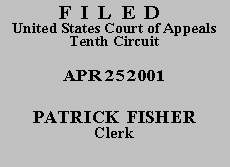

| WILLIAM SCOTT ALTIZER,
Petitioner-Appellant, |
|
| v. | |
| DAYTON J. POPPELL, Warden,
Respondent-Appellee. |
|
Petitioner William Scott Altizer seeks a certificate of appealability to appeal the district court's dismissal of his 28 U.S.C. § 2254 petition for writ of habeas corpus as untimely. We deny the request for a certificate of appealability and dismiss the appeal.
Altizer entered a guilty plea in state court to accessory after the fact to murder in the first degree, and was sentenced to twenty-five years' imprisonment. On September 11, 1996, the Oklahoma Court of Criminal Appeals affirmed his conviction. On September 2, 1997, Altizer filed an application for post-conviction relief in state court, contending (1) the court improperly allowed victim impact statements at sentencing; (2) the court improperly allowed emotional testimony at sentencing; (3) defense counsel should have requested a competency hearing; (4) the trial court improperly accepted as evidence an affidavit regarding Altizer's competency; (5) the sentence was improper and grossly disproportionate compared to that of a codefendant; (6) he received ineffective assistance of counsel; (7) the trial court erred in not hearing Altizer's amended motion to withdraw his plea; and (8) the cumulative errors resulted in excessive and disproportionate sentencing. His application was denied on June 25, 1999. On October 5, 1999, the Oklahoma Court of Criminal Appeals affirmed the denial, finding issues 4 and 5 were rejected in the direct appeal, and the remaining issues could have been raised in the direct appeal.
Altizer filed his § 2254 petition on August 30, 2000, alleging (1) an improper sentencing hearing and ineffective assistance of counsel; (2) error in denial of his motion for new trial, motion to withdraw plea, and motion to modify sentence; (3) failure of counsel to request a competency hearing; (4) the trial court improperly accepted as evidence an affidavit of competency; (5) ineffective assistance of counsel in advise to enter "blind plea"; (6) defense counsel failed to seek extraordinary relief; and (7) the trial court failed to enter uniform sentences against all codefendants. On September 28, 2000, the magistrate court issued its report and recommendation. Altizer filed his objections on October 18, 2000. On October 25, 2000, the district court adopted the magistrate's report and dismissed the habeas petition as untimely filed.
On appeal, Altizer contends we should construe the language in U.S.C. § 2244(d)(1) as meaning the statute of limitations commences only after all state court remedies have been exhausted. In the alternative, if the petition was not timely, Altizer should be granted an equitable tolling of the limitation period because the statute is ambiguous.
As Altizer filed his habeas petition on August 30, 2000, the provisions of the Antiterrorism and Effective Death Penalty Act of 1996 (AEDPA) apply. See Lindh v. Murphy, 521 U.S. 320, 336 (1997). The one-year statute of limitations in 28 U.S.C. § 2244(d)(1) generally begins to run from the date on which a prisoner's direct appeal from his conviction becomes final. Hoggro v. Boone, 150 F.3d 1223, 1225-26 (10th Cir. 1998).
Was Altizer's habeas petition timely filed within the one-year statute of limitations? As applied to Altizer, the statute of limitations began to run on December 10, 1996, ninety days after his direct appeal was affirmed. See Rhine v. Boone, 182 F.3d 1153, 1156 (10th Cir. 1999) (holding a state court conviction does not become final until the time for filing a certiorari petition expires), cert. denied, 528 U.S. 1084 (2000). At the time he filed his application for post-conviction relief in state court (September 2, 1997), 266 days had elapsed since his conviction had become final. The statute of limitations was tolled through October 5, 1999, the date the Oklahoma Court of Criminal Appeals denied the application. See Hoggro, 150 F.3d at 1226 ("[T]he statutory language in § 2244(d)(2) requires the federal courts to toll time spent in state-court post-conviction litigation."). From October 5, 1999, Altizer had ninety-nine days remaining in the limitations period in which to file his federal habeas petition. However, he filed his petition on August 30, 2000, over seven months after expiration of the limitations period.
Altizer argues, in the alternative, that the limitation period should be equitably tolled "based upon the ambiguity" of § 2244(d)(1) and (2). There is no basis in the record for equitable tolling of the limitation period. See Hoggro.
Altizer's request for a certificate of appealability is DENIED. The appeal is DISMISSED. The mandate shall issue forthwith.
Entered for the Court
Mary Beck Briscoe
Circuit Judge
*.This order and judgment is not binding precedent, except under the doctrines of law of the case, res judicata, and collateral estoppel. The court generally disfavors the citation of orders and judgments; nevertheless, an order and judgment may be cited under the terms and conditions of 10th Cir. R. 36.3.